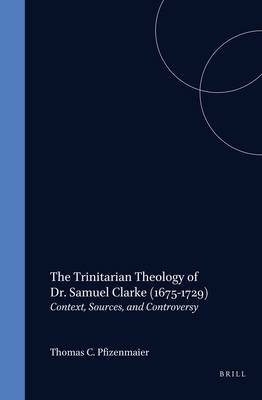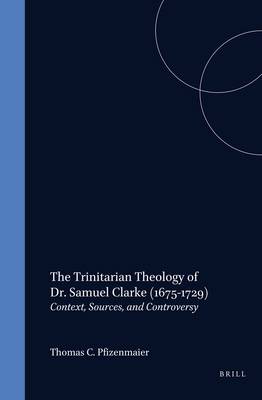
- Retrait gratuit dans votre magasin Club
- 7.000.000 titres dans notre catalogue
- Payer en toute sécurité
- Toujours un magasin près de chez vous
- Retrait gratuit dans votre magasin Club
- 7.000.000 titres dans notre catalogue
- Payer en toute sécurité
- Toujours un magasin près de chez vous
The Trinitarian Theology of Dr. Samuel Clarke (1675-1729)
Context, Sources, and Controversy
Thomas C Pfizenmaier
125,90 €
+ 251 points
Description
This volume deals with the trinitarian debate in early eighteenth-century England. Samuel Clarke's trinitarian thought represents a reappraisal of that doctrine in the light of early modern philosophy and close Patristic study. This work utilizes current studies on the fourth-century debate, recent evaluations of Latitudinarianism, and previously unpublished theological manuscripts of Sir Isaac Newton's, to shed light on Clarke's treatment of this central Christian doctrine. The conclusion calls for a reclassification of Clarke's thought by historians of doctrine.
The volume is organized in three parts. The first examines Clarke's intellectual milieu, the second treats his use of sources, and the third evaluates his role in the Trinitarian controversy.
Students of Latitudinarianism, the doctrine of the Trinity and Isaac Newton's thought will all profit from this discussion. In addition, those interested in the relationship between science and religion will benefit.
The volume is organized in three parts. The first examines Clarke's intellectual milieu, the second treats his use of sources, and the third evaluates his role in the Trinitarian controversy.
Students of Latitudinarianism, the doctrine of the Trinity and Isaac Newton's thought will all profit from this discussion. In addition, those interested in the relationship between science and religion will benefit.
Spécifications
Parties prenantes
- Auteur(s) :
- Editeur:
Contenu
- Nombre de pages :
- 234
- Langue:
- Anglais
- Collection :
- Tome:
- n° 75
Caractéristiques
- EAN:
- 9789004107199
- Date de parution :
- 01-03-97
- Format:
- Livre relié
- Format numérique:
- Genaaid
- Dimensions :
- 166 mm x 247 mm
- Poids :
- 594 g







